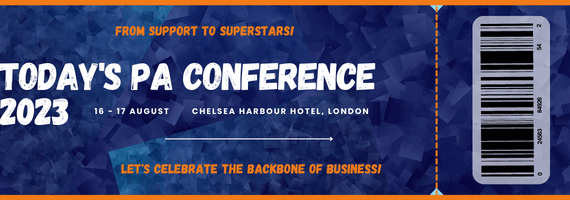Shopping cart
Your cart is empty
£0.00

Julia Hoggett understands and appreciates the true value of a good PA. Throughout her high-profile career in Financial Services, she has helped many organisations develop a corporate culture in which women – in all roles and at all levels – can fulfil their potential. In 2014, Julia joined the Financial Conduct Authority (FCA), and is their Gender Champion on the Executive Diversity Committee. She is now the FCA’s Director of Market Oversight, with responsibility for the conduct of participants in the primary and secondary financial markets. It’s a challenging and demanding environment, and Julia is happy to acknowledge that she could not be as effective and as productive in her role without her PA, Emma Dabner, who she has worked with since joining the FCA.
We will be welcoming Julia as a guest at the Today’s PA Conference later this month. She will be joining our speakers and fellow industry experts to discuss ‘What Business Leaders look for in their PAs’. When we spoke to her recently, we talked about the image of PAs in the workplace, and how organisational structure plays a part in building a successful team.
“The first thing I would say is that it’s not an image that resonates with me. However, I do understand how it might feel that way to some people. I don’t think there is a unified identity for the role, and that’s something to be worked on. We also need an overt conversation about the value of PAs in any workplace.
Within the Financial Services industry, I think PA role is probably perceived in as many different ways as it is in other industries. There will be people who don’t see it in the slightest way as “tea and typing” – myself included – and there will be others who may.
It’s probably the nature of organisations, cultures, managers, and the nature of the PAs themselves, too, I suspect, that has all contributed to that [image]. However, what we see in broader society is that in some quarters, roles which are more likely to be filled by women do run the risk of being valued differently. I think that might make it harder to break down some of those stereotypes.
I think that they are fundamental to the individual teams in which they work, but they are also a team in their own right. I don’t view them in as any way separate. They are a vital component of the work that we do, and I would expect any of my managers to see their PAs, and indeed all their administrative staff in exactly that light, as a fundamental part of the team.
The reality is that organisations structure themselves differently. If you structure yourself as having, for example, one PA per team, then all those people are part of one team. If you structure it as a pool of administrators and assistants who support any of the Managers or teams in a company or organisation, then that tends to create a different and possibly less of a team dynamic.
For me, it’s essential that you create and structure your organisation to have roles that enable everybody within it to feel part of the wider whole. I wouldn’t want to have a pool-type structure that did not enable PAs or administrators to feel part of the teams they were supporting. I feel it isn’t an appropriate way of recognising the role they play, and I don’t think it would work as effectively. That’s my experience – but organisations are structured in many different ways.
I have what I would characterise as both a superb but also a crucial relationship with my PA.
Very simply put, I could not do my job anything like as well as I aspire to do it without my PA. I have said, quite publicly, that on the days when she’s not there, I am not as effective.
To be really effective, you need a relationship of trust, you need a relationship of understanding, and you need a bit of give and take. It’s about finding someone who can support what it is you need to do, but also take ownership and drive it as well. That’s one of the things Emma does superbly.
Both she and I view her role as a profession in its own right. She takes great pride in doing what she does incredibly well, but also in innovating and changing. Where opportunities arise to do things differently or more effectively, then very often she will be the person who brings those proposals to me.
I have a simple attitude to the role people play in any workplace. If, as an organisation, you have determined that you need all of these roles, then you have done so because these roles need to be fulfilled in order for the organisation to meet its objectives. Therefore, every single component contributes to the organisation meeting those objectives. I have always viewed the PAs and all the administrative staff as vital components of the team. We would not meet our objectives without having an effective group of people who drive the operational and administrative environment in which we get all of things done.
It is important, though, to recognise that this is a skill and an art in itself. Anybody who has ever had a really good PA or a really good secretary knows when they have, and therefore, by definition, knows when they haven’t! They become all the more aware of the value of their PA. My ability to work at the rate that I want to work at is a direct result of having a superb PA. I simply wouldn’t get through the volume of work that I do without that.
In any senior role, there are a huge number of daily tasks, activities and decisions, so ensuring that you are on top of all of those things is essential to being an effective leader. But you can’t do it on your own. You need someone to organise you, and to organise the world around you to enable you to focus on making those decisions, on driving those activities.
As a network, PAs are incredibly good at understanding how to navigate an organisation, how the policies and procedures work, how things happen, how things get done. They become, at best, part of the discipline of that organisation as well as facilitators of the business. That means there will be times when I turn to my PA, and say, “how do we do that, again?”, and she’ll know! I don’t need to worry because I’ve got someone I can go to who can answer that question for me. It gives me the headspace to think about other elements of my job.
When we first started working together – actually, before I had even arrived at the FCA – we had a 45 minute conversation about how I worked. Emma got the measure of me and my working style, how I liked to do things and how I liked to structure my days. When I arrived [at the FCA] that was how Emma had structured my days. Obviously, this has evolved over the years because certain things work and certain things don’t, but you learn that together.
We sit right next to each other and talk to each other all the time. We don’t necessarily sit down for ten minutes in the morning and go through the day. When I’m at my desk, we tend to be talking all the way through. In certain roles, when I’ve not always been at my desk, when it’s been more an exercise in running from meeting to meeting, then we have tried to schedule a point in the day to make sure we’re on top of things, and that she’s told me everything she needs me to do. We’ve increasingly found electronic ways of doing that. For instance, she manages my electronic task list as well as my calendar and emails.
Recently – for my own sake, for the building’s sake, and for environmental reasons – Emma determined that we should go paperless. I agreed it was a good idea, and in less than a week, I had gone paperless! That was her determining that we needed to evolve the way we worked. Her preparing a folder for me every week or every day and me wandering around with it is not as effective as me having an electronic version of the same thing. So she made it happen. You need to recognise that as your role changes and evolves, you need to evolve your ways of working as well. We do that a lot of the time, and Emma is very often the trigger for that innovation.
There is another aspect, too. One part of the role is managing me in my day – I describe it as winding me up and pointing me in the right direction. But Emma’s role has grown over the years as our working together has grown, and she now takes much more responsibility for the operational structures in the areas I run. However, she also supports me in making any changes I feel I need to make to my own ways of working. For example, if you have a tendency to work in certain ways, but you want to adjust or correct that, then often your PA can be the best facilitator of that change. In the past, I have had the odd tendency to micro-manage. But I now trust Emma to say, “I’m going to direct that to where it should be done, I’ll tell you where I’ve directed it, and I’ll make sure you see the outcome, but I’m not going to let you near the process”. And that’s really powerful. It’s helped me become more effective as my own role has become broader and broader, and bigger and bigger. So it’s not just about supporting the work I do, it’s also about supporting my ways of working. That’s a vital part of what some of the best PAs can do.
I think trust is essential. The best relationships are somewhat symbiotic. It requires your PA to understand you, and it requires them to have all the necessary information they need in order to support you. It also requires absolute discretion, and a PA who also understands not necessarily the fine detail of a complex piece of policy or business decision, but the fundamental context in which the work is being done. I think that needs ongoing communication and trust. It also requires respect – which, to me, is critical in the workplace, anyway. And it requires my PA to tell me when I need to sit down and get something done, to tell me that I need focus, not to go off to have that conversation – that can wait, this is more important. It requires a high level of communication and mutual respect, which is essential for getting the job done. For someone to be as effective as possible with their PA, they need that mutual trust and respect from the get-go.
Thank you very much for your time today, Julia. We look forward to seeing you on our PA PAnel, and hearing more of your thoughts on ‘What Business Leaders look for in their PAs’.
___________________
Julia Hoggett will be a guest on our expert PA Panel at the Today’s PA Conference on 25th August.



Tel.: +44 (0)20 7622 2400
Email: info@todayspa.co.uk
Today's PA
52 The Warwick Building
Chelsea Bridge Wharf
366 Queenstown Road
London
SW11 8NJ
Copyright © 2024 Today's PA. All rights Reserved.
We use cookies, just to track visits to our website, we store no personal details.
ACCEPT COOKIES What are cookies?